Le Musée du bagne en Nouvelle-Calédonie et ses constructions identitaires / The Penal Colony Museum in New Caledonia and its Identity Constructions
Main Article Content
Abstract
Au XIXème siècle, la Nouvelle-Calédonie et l'Australie étaient des colonies pénitentiaires dans le Pacifique Sud. L’analyse du discours muséal des deux musées (Hyde Park Barracks à Sydney et le projet pour un musée du bagne à Nouméa) se base sur la période pénitentiaire pour mettre en lumière les difficultés que l’on peut avoir à affronter son passé de violence. Même si ces deux pays ont une histoire différente, le but commun est d'accepter cette partie de leur généalogie. Après avoir été tabou, avoir des ancêtres criminels est maintenant une source de fierté; l'exil n'est plus considéré comme une expulsion de la patrie britannique ou française, mais plutôt comme une aventure de pionniers. Ceci entraîne un déni d'autres aspects de la colonisation et réduit la participation ou les interactions entre communautés dans la construction de l’histoire mémorielle. Nous devons également garder à l'esprit que les musées jouent un rôle politique. En Nouvelle-Calédonie, il est évident que le processus d'autodétermination prévu entre 2014-2018 a influencé le projet du musée à Nouville. Un bagnard dans la famille prouvera votre ancrage dans cette terre et pourrait justifier votre droit de vote dans le référendum. Ces musées n’évoquent pas seulement l'histoire mais préparent aussi l’avenir.
Article Details
Section
For submissions from 31st March 2014 onwards, authors who submit articles to this journal for publication agree to the following terms:
a) Retaining Copyright and Granting Rights:
Authors retain copyright and grant the journal the right of first publication. The work is simultaneously licensed under a Creative Commons Attribution License, allowing others to share and adapt the work. Acknowledgment of the work's authorship and initial publication in this journal is required.
b) Non-Exclusive Distribution:
Authors may enter into separate, additional contractual arrangements for the non-exclusive distribution of the journal's published version of the work (e.g., posting to an institutional repository or publishing in a book). Acknowledgment of its initial publication in this journal is required.
c) Online Posting and Citation Advantage:
Authors are encouraged to post their work online (e.g., in institutional repositories or on their website) prior to and during the submission process. This may lead to productive exchanges and earlier and greater citation of the published work (See The Open Access Citation Advantage Service). If authors include the work in an institutional repository or on their website, they must acknowledge the UTS ePRESS publication with relevant details.
d) Creative Commons Attribution (CC-BY) License Awareness:
Authors should note that the CC-BY License permits readers to share (copy and redistribute) and adapt (remix, transform, build upon) the work for any purpose, including commercial use. Proper credit, a link to the license, and indication of any changes made must be provided. The manner of doing so must not suggest endorsement by you or your publisher.
For Volume 10 No 2 (2013) and earlier, the following copyright applied:
Authors submitting a paper to UTSePress publications agree to assign a limited license to UTSePress if and when the manuscript is accepted for publication. This license allows UTSePress to publish the manuscript in a specific issue.
Articles published by UTSePress are protected by copyright, with rights retained by the authors, who assert their moral rights. Authors control translation and reproduction rights to their works published by UTSePress. All rights are reserved worldwide by UTSePress, and downloads of specific portions are permitted for personal use only, not commercial use or resale.
For reprint or usage permissions, please direct inquiries to UTSePress via the journal's main editor, Dr. Nicholas Manganas at [portal.scholarly.journal@gmail.com]. Reprint permission requires acknowledgment of both UTSePress and PORTAL in the format advised by the journal editor.
